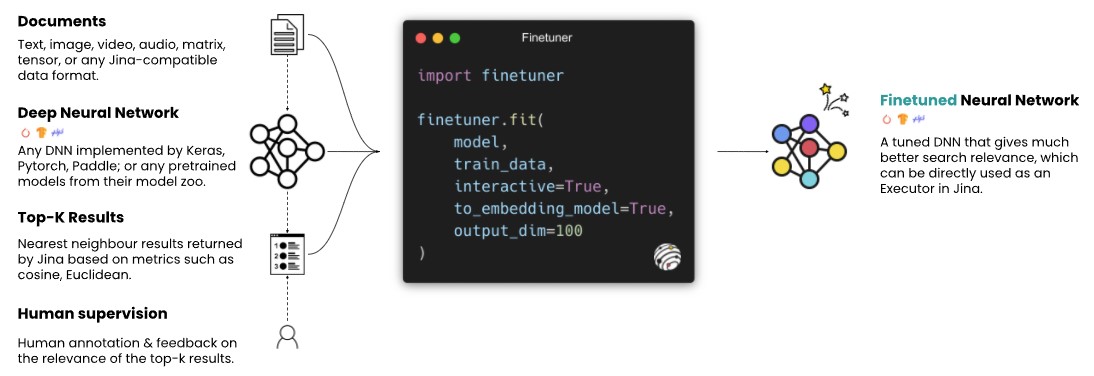Berlin-based Jina.ai, an open source startup that uses neural search to help its users find information in their unstructured data (including videos and images), today announced that it has raised a $30 million Series A funding round led by Canaan Partners. New investor Mango Capital, as well as existing investors GGV Capital, SAP.iO and Yunqi Partners also participated in this round, which brings the company’s total funding to $39 million to date.
Jina.ai CEO and co-founder Han Xiao, who co-founded the company together with Nan Wang and Bing He, explained that the idea behind neural search is to use deep learning neural networks to go beyond traditional keyword-based search tools. Making use of relatively new machine learning technologies like transfer learning and representation learning, the company’s core Jina framework can help developers quickly build search tools for their specific use cases.
“Given an image, audio, video or whatever — we first use deep neural networks to translate this data format into a universal representation,” Xiao explained. “In this case, it’s mostly a mathematic vector — 100-dimensional vectors. And then, the matching [algorithm] does not count how many letters match but counts the mathematical distance, the vector distance between these two vectors. In this way, you can basically use this kind of methodology to solve all kinds of data search problems or relevance problems.”
Xiao described Jina as akin to TensorFlow for search (with TensorFlow being Google’s open source machine learning framework). Just like TensorFlow or PyTorch defined the design pattern of how people design AI systems, Jina wants to define how people build neural search systems — and become the de facto standard for doing so in the process.
But Jina is only one of the company’s current set of products. It also offers the Jina Hub, a marketplace that allows developers to share and discover the building blocks for Jina-based neural search applications, as well as the recently launched Finetuner, a tool for fine-tuning any deep neural network.
“Over the last 18 months, we spent a lot of effort on building the core infrastructure, on building the foundation of this big neural search tower — and that part is already done,” Xiao said. “And now we are slowly building the first floor, the second floor of this big building — and we try to provide an end-to-end development experience.”

The company says the Jina AI developer community currently counts about 1,000 users, with applications that range from a video game developer who use it to auto-fill relevant game assets in the right-click many of its game editor to a legal-tech startup that uses it to enable its chatbot to provide a Q&A experience that draws on data from PDF documents.
The open source Jina framework already has almost 200 external contributors since its launch in May 2020 and the company also hosts an active Slack community around the project.
“The reasons we are doing open source is mostly because of the velocity of open source — and I believe the velocity of the development is a key factor for the success of a software project. A lot of software just dies because this velocity goes to zero,” Xiao said. “We are building the community and we are leveraging the community to gather feedback to iterate fast. And this is super important for infrastructure software like us. We are building the community. And we are leveraging the community to gather feedback to fast iterate. And this is super important for infrastructure software like us. You need all these top-tier developers to give your feedback about the usability, accessibility and so on in order to improve it quickly.”
Jina.ai plans to use the new funding to double its team and especially to expand its operations in North America. With this expanded team, the company plans to invest in R&D to expand the overall Jina ecosystem and launch new tools and services around it.
“Traditional search systems built for textual data don’t work in a world brimming with images, video, and other multimedia. Jina AI is moving companies from black and white into color, unlocking unstructured data in a way that’s fast, scalable, and data-agnostic,” said Canaan Partners’ Joydeep Bhattacharyya. “The early applications of its open-source framework already show glimmers of the future, with neural search underpinning opportunities to improve decision-making, refine operations and even create new revenue streams.”































Comment